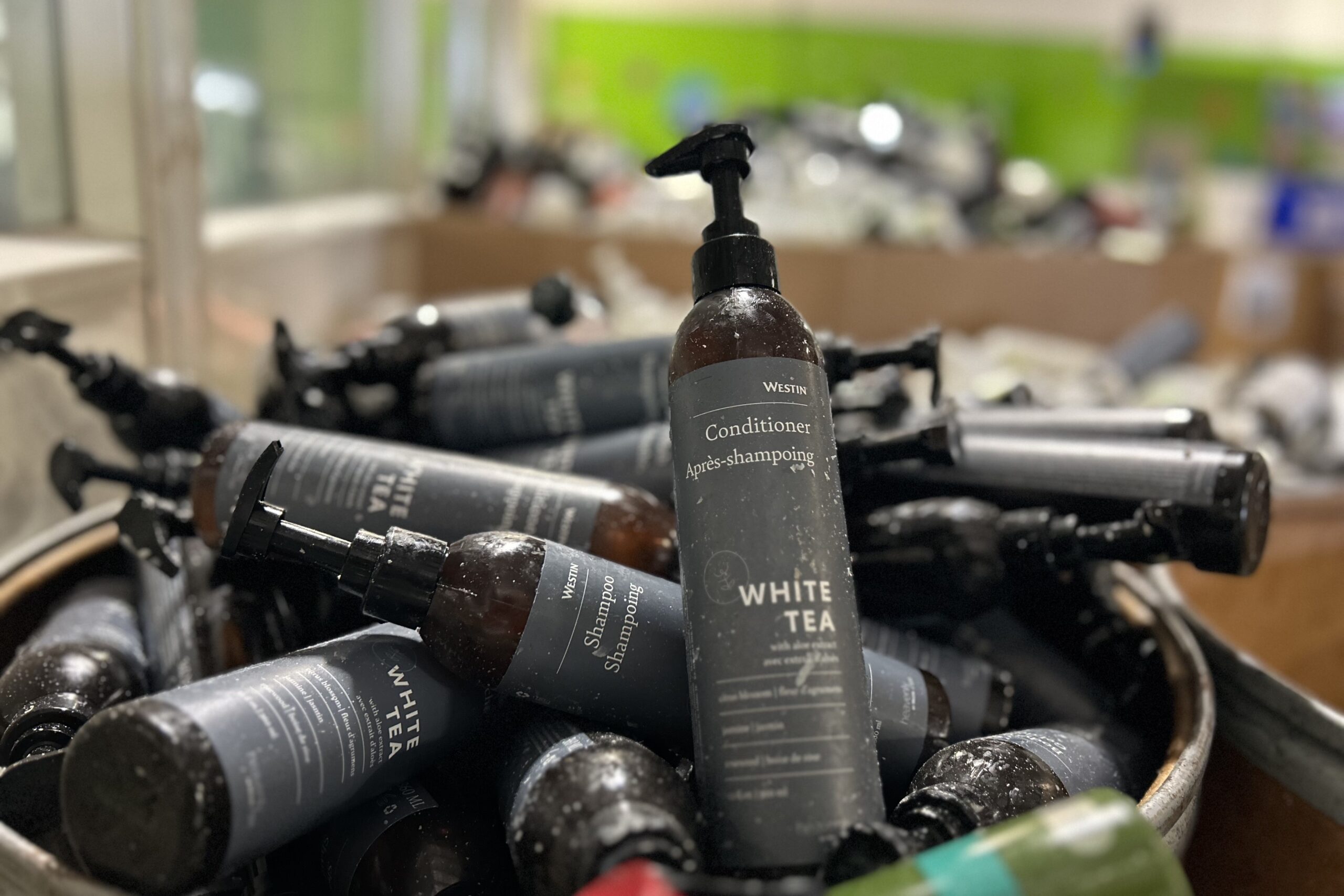Hotels Switch to Refillable Amenities – A Growing Trend in UK & EU
Across the UK and Europe, hotels are rapidly phasing out single-use toiletry bottles in favor of bulk-size, refillable dispensers. In recent years, nearly every major hotel group has announced this switch as part of sustainability initiatives. Marriott International, for example, replaced mini shampoo and bath gel bottles worldwide by 2020, a move projected to keep about 500 million tiny plastic bottles (around 1.7 million pounds of plastic) out of landfills each year[1]. IHG (InterContinental Hotels Group) similarly committed to bulk amenities across its 5,600+ hotels by 2021, eliminating an estimated 200 million miniature bottles annually[2]. Other brands followed suit: Hotel Group aims to roll out refillable pumps in all its properties by 2025, a change expected to eliminate 57 million mini bottles (nearly 500 tons of plastic) every year[3].
Several factors drive this trend. Guests increasingly expect eco-friendly practices – in one global survey 75% of travelers said they want more sustainable travel choices[4]. Visibly ditching disposable toiletries is an easy way for hotels to show commitment to reducing waste. At the same time, regulators are upping the pressure. The European Commission has proposed an EU-wide ban on miniature hotel toiletry packaging as part of its Green Deal targets, meaning these small bottles could disappear entirely by 2030[5]. The UK is moving in a similar direction, with many hospitality brands proactively aligning to avoid being “left behind” on sustainability. In short, switching to refillable bathroom amenities is becoming the new normal for hotels in Europe and the UK – aligning with both guest values (“Your guests care. Show them you do too.”) and emerging regulations.
Refillable Dispensers Cut Plastic Waste (But Not All Plastic)
There’s no doubt that bulk dispensers dramatically reduce plastic waste. By installing wall-mounted pumps and large bottles, hotels can stop providing dozens of single-use 30ml bottles to every guest. Marriott noted that one large pump bottle contains as much product as 10–12 mini bottles, which not only cuts plastic by ~30% annually but also reduces the unused product thrown away[1][6]. For hotel groups with hundreds of thousands of rooms, the plastic reduction reaches into the hundreds of tons per year. This is a big win for sustainability.
However, it’s important to recognize that refillable does not mean “no plastic”. Bulk amenities usually arrive in large plastic jerrycans or 5-liter refill bottles that must be handled behind the scenes. For instance, a standard 5L shampoo or soap container can refill a 300ml bathroom dispenser bottle about 15 times[7], greatly reducing total packaging waste versus 15 individual bottles. But once that 5L jerrycan is empty, it becomes waste itself. Many hotels might overlook this “hidden” plastic: if those bulk containers aren’t recycled or reused properly, the environmental benefits shrink. The good news is that most quality bulk packaging today is recyclable, and programs exist to help hotels ensure these don’t end up in landfill. (For example, Clean the World’s Hospitality Recycling program accepts large amenity bottles and jerrycan plastic jugs for recycling[8].) To truly “meet guest expectations around sustainability” without greenwashing, hotels should have a plan for responsibly the management of empty refill jerrycan’s and worn-out dispensers. This closed-loop approach makes sure the plastic we don’t hand to guests isn’t simply shifting the waste burden behind the scenes.
The Hygiene Challenge of Bulk Amenities
Switching to bulk toiletries isn’t only about logistics and plastic, it also introduces new hygiene responsibilities that hoteliers must manage. Unlike disposable bottles which are single-use, those refillable pumps will serve dozens of different guests over time. If not properly maintained, they can become a breeding ground for bacteria and an inadvertent risk to guest health. Busy hotel managers might be time-poor, but overlooking dispenser hygiene would undermine the very guest satisfaction they hope to improve. Here’s what you need to know:
- How Does Contamination Happen? Every time an “open” refillable dispenser is topped up, there’s a chance for environmental microbes or dirty nozzles to introduce bacteria[12]. Unlike sealed single-use bottles, these pumps retain the same reservoir over months of use. Soap and shampoo formulas do contain preservatives, but over time those can be defeated by persistent contamination. Bacteria often form a biofilm inside pump mechanisms and around the bottle neck. Once established, that biofilm can continuously shed microbes into the product with each pump[13][14]. Warm, humid bathroom conditions only encourage microbial growth – so without intervention, a wall dispenser might quietly accumulate a cocktail of germs. This is why global health authorities like the CDC and WHO have advised against the practice of simply “topping off” liquid dispensers indefinitely[15]. Many healthcare facilities actually ban refill-style soap dispensers for this reason, opting for sealed cartridges instead[16].
- Best Practices to Ensure Hygiene: Refillable amenities can be perfectly safe if hotels implement the right sanitation routine. Housekeeping staff should never just pour new product on top of old; instead, empty and clean the bottles first. In fact, Hilton’s own dispenser program guidelines instruct that whenever bottles need refilling, they must be taken out, cleaned and disinfected “back of house” before returning to guest rooms[17]. Ideally, hotels keep a set of extra clean bottles: when a room’s dispenser is low, a pre-sanitized bottle can replace it, and the empty is taken away for cleaning/refilling. Regular cleaning of the pump mechanisms is crucial as well (e.g. rinsing or soaking pump heads to clear any soap buildup). Even with good cleaning, dispenser bottles should not be used indefinitely – over time, wear and micro-scratches can harbor bacteria that become hard to eliminate completely. Many hotel brands set a replacement schedule for bulk amenity bottles. For example, one brand standard recommends that refillable bottles be discarded and replaced every 6 months to ensure optimal sanitation[18]. Some operators set either a time limit (6–12 months in service) or a usage limit (after roughly 15 refills or uses, replace the bottle) as a rule of thumb. By adhering to these proactive replacement intervals, you avoid the scenario of a dispenser that’s been hanging in the shower for years accumulating grime.
- Choose the Right Hardware: Not all dispensers are created equal. Look for tamper-proof, easy-to-clean designs. Newer systems have features like no-drip valves or even disposable pump cartridges that can be swapped periodically. (For instance, certain manufacturers offer sealed refill pouches or cartridges – these reduce contamination risk since the soap is never exposed to air until use.) If you use fully refillable pump bottles, ensure the pumps have good seals and consider ones with anti-bacterial materials or coatings. Also, transparent bottles with indicator windows help staff see when cleaning or replacement is due (e.g. if you notice discoloration or residue inside, swap it out). Mounting brackets should be secure but also allow staff to remove bottles easily for maintenance – if it’s a hassle to take the bottle out, staff may be tempted to just pour new product in on the fly, which we want to discourage.
In summary, bulk dispensers require a hygiene plan. As a sustainability-focused hotel leader, you don’t want a well-intentioned plastic-reduction effort to backfire with a guest illness or a ding to your reputation. The solution is straightforward: establish cleaning protocols, train your housekeeping team, and stick to regular replacement cycles for the dispenser units. With these steps, you can confidently offer refillable toiletries that are both eco-friendly and safe for guests.
(Remember: visible cleanliness matters too – guests notice if a pump looks grimy. A sparkling clean dispenser reassures guests and reinforces your quality standards, turning this into a point of customer satisfaction rather than a liability.)
Making Refillables Work: Tips for Safe, Sustainable Implementation
Finally, let’s put it all together into actionable best practices. If your hotel (or hotel group) is joining the refillable amenities movement, here are some key tips to ensure success:
- 1. Plan for Recycling & Waste Reduction: Bulk amenities cut plastic waste dramatically, but only if you handle the back-end properly. Set up a system to recycle empty 5L refill jugs and old dispenser bottles. Work with suppliers or programs (like Clean the World or local recyclers) that will take these materials off your hands responsibly[8]. This ensures you truly “deliver measurable ESG impact” – you can literally weigh and report how much plastic you’ve diverted from landfill. Many leading hotels even publicly share stats (e.g. “Hilton has collected millions of used soap bars and bottles for recycling”[19]) to show transparency and avoid greenwashing accusations.
- 2. Choose Quality Dispensers and Products: Invest in well-designed dispenser hardware that is lockable (for tamper resistance) and durable. Avoid cheap pumps that clog or leak, as they will frustrate guests and staff alike. Consider partnering with reputable toiletry brands that offer eco-certified products in bulk – this appeals to guests and aligns with corporate ESG goals. In the UK, for example, some boutique hotels source local, natural toiletries in 5L format to showcase both sustainability and luxury. Ensure the bulk products have adequate preservatives (ask the supplier about shelf-life once opened) so they remain fresh between refills.
- 3. Establish Strict Housekeeping Protocols: Create a clear SOP (Standard Operating Procedure) for maintaining dispensers. This should include: removing bottles for cleaning before refilling (no topping-off in place), disinfecting bottles and pumps thoroughly, and using fresh gloves or sanitized hands during the refill process to avoid introducing germs. Train your housekeeping team on these steps and why they matter – linking it to guest safety will help gain buy-in. Make it as easy as possible for staff: e.g. keep a cleaning station in housekeeping areas with the proper brushes, sanitizing solution, and a drying rack for dispenser bottles.
- 4. Track and Schedule Replacements: Keep a log or use a label system to know when each dispenser bottle was put into service. This way, you can replace them on schedule (say, every 6 months) proactively[18]. Some hotels use color-coded stickers or write install dates under the bottles. If a dispenser shows any damage, mold, or persistent residue, swap it out immediately – even if it’s before the scheduled time. The cost of a new bottle or pump is minor compared to the cost of a potential hygiene incident or bad review.
- 5. Monitor Guest Feedback and Involve Them: Pay attention to what guests say about the new amenities. Most guests will appreciate the eco-friendly approach, but ensure they also feel the convenience and cleanliness. If you get feedback about pumps not working, low soap, or concerns about hygiene, address it promptly and adjust your process if needed. Consider a small note in bathrooms like: “These refillable toiletries save X plastic bottles from waste each year. If anything is low or amiss, please let us know – your comfort and safety are our priority.” This communicates your purpose (guests love knowing their hotel is “the hotel they’re proud to stay in” for sustainability) and invites trust by being transparent.
By following these steps, you will maximize the benefits of switching to refillables while mitigating the risks. The outcome? Your hotel will cut down on plastic waste, meet emerging regulations ahead of time, and impress environmentally conscious guests – without compromising on hygiene or quality. It’s a tangible way to “future-proof your ESG reporting” and show innovation, rather than just ticking a box.
Conclusion: Sustainability is in the Details
The move to bulk toiletries in hotels is more than a trend – it’s fast becoming an industry standard in the UK, Europe, and beyond. It offers a clear win for waste reduction and aligns with what guests and regulators expect from modern, responsible hospitality. But as we’ve highlighted, success lies in the details. True sustainability means considering the full lifecycle of those amenities (from the 5L jerrycan in your storage room to the dispenser on the wall) and ensuring cleanliness every step of the way.
Hotels that get it right will reap the rewards: lower costs over time, less waste hauling, happier guests who see the effort, and maybe even a marketing edge (“Don’t get left behind – be the hotel your guests are proud to stay in” really rings true here). Those that cut corners – say, never cleaning their dispensers or neglecting to recycle – risk either hygiene problems or cynicism from increasingly savvy travelers.
As a sustainability-focused hospitality leader, you have the opportunity to lead by example. By adopting refillable amenities and implementing robust hygiene and recycling practices, you demonstrate that your property is not just hopping on a green bandwagon, but truly committed to making a difference. Programs like Clean the World can support you in this journey, ensuring that even the “hidden” waste (used soap, empty bulk bottles) gets diverted from landfills and put to good use[20][8]. The end result is a cleaner world and a compelling story to share with your guests and stakeholders.
In the quest to hit ESG targets and delight guests, remember: sustainability and sanitation must go hand-in-hand. Refillable toiletry dispensers, done right, allow you to achieve both. So go ahead and embrace the change – just do so with a plan to keep it clean, safe, and truly green. Your guests (and the planet) will thank you for it.
Sources:
- Marriott International press release on eliminating single-use toiletry bottles (500M bottles/year reduction)[1].
- IHG news release on switching 843,000 rooms to bulk amenities (200M bottles/year eliminated)[2].
- Radisson Hotel Group sustainability update (57M mini bottles, ~500 tons plastic saved annually with dispensers)[3].
- Euronews – EU proposal to ban miniature toiletries as part of Green Deal packaging rules[5].
- Out of Eden hospitality supplier – bulk refill systems (5L container refills 300ml bottle ~15×)[7].
- Clean the World – hospitality recycling program info (ability to recycle large amenity bottles/jerrycans)[8].
- University of Arizona for Clean the World study – 100% of tested hotel refillable dispensers contaminated; 76% exceeded safe bacteria levels[9].
- Summit Hygiene report – 1 in 4 bulk soap dispensers found with high bacteria; washing with contaminated soap left 25× more germs on hands[10].
- CDC/WHO guidance against “topping off” refillable soap dispensers due to contamination risk[15].
- Hilton Hotels SOLera dispenser guide – staff should clean/disinfect bottles at refill and replace every 6 months for sanitation[17][18].
[1] [6] Plastic waste: Marriott, the world’s largest hotel chain, plans to eliminate single-use plastic toiletries by 2020 – CBS News
[2] End of the road for bathroom miniatures as IHG opts for bulk-size amenities to reduce plastic waste – InterContinental Hotels Group PLC
[3] [4] Radisson Hotel Group builds on sustainability commitment wit…
[5] New EU plastic waste ban could mark the end of miniature hotel toiletries | Euronews
[7] The Eden range: a style to suit everyone – Out of Eden
[8] [20] Hyatt Hospitality Recycling Program for EU & UK | Clean the World
https://cleantheworld.org/hyatt-hospitality-recycling-program-euuk/
[9] Research Conducted For Clean the World: Bacterial Contamination Common In Refillable Dispensers – Clean the World
[10] [12] [15] [16] The Hidden Risks Of Refillable Soap Dispensers – Summit Hygiene
[11] Is It Safe to Use Refillable Toiletries in a Hotel Room? | SmarterTravel
https://www.smartertravel.com/refillable-hotel-toiletries-safety/
[13] [14] Hygiene Study – ADA Cosmetics
https://ada-cosmetics.com/dispenser-solutions/hygiene-study/
[17] [18] PowerPoint Presentation
https://www.palmerhousehiltonhotel.com/images/2020/01/SOLeraProgramGuide_AM.pdf
[19] Major Hotels Make Move To Bulk-Size Toiletries
https://cleantheworld.org/blog/major-hotels-make-move-to-bulk-size-toiletries/






